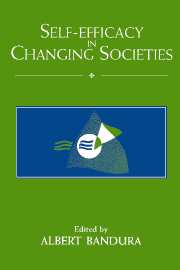Book contents
- Frontmatter
- Contents
- Foreword
- Preface
- List of contributors
- 1 Exercise of personal and collective efficacy in changing societies
- 2 Life trajectories in changing societies
- 3 Developmental analysis of control beliefs
- 4 Impact of family processes on control beliefs
- 5 Cross-cultural perspectives on self-efficacy
- 6 Self-efficacy in stressful life transitions
- 7 Self-efficacy and educational development
- 8 Self-efficacy in career choice and development
- 9 Changing risk behaviors and adopting health behaviors: The role of self-efficacy beliefs
- 10 Self-efficacy and addictive behavior
- Name Index
- Subject Index
7 - Self-efficacy and educational development
Published online by Cambridge University Press: 04 August 2010
- Frontmatter
- Contents
- Foreword
- Preface
- List of contributors
- 1 Exercise of personal and collective efficacy in changing societies
- 2 Life trajectories in changing societies
- 3 Developmental analysis of control beliefs
- 4 Impact of family processes on control beliefs
- 5 Cross-cultural perspectives on self-efficacy
- 6 Self-efficacy in stressful life transitions
- 7 Self-efficacy and educational development
- 8 Self-efficacy in career choice and development
- 9 Changing risk behaviors and adopting health behaviors: The role of self-efficacy beliefs
- 10 Self-efficacy and addictive behavior
- Name Index
- Subject Index
Summary
The ultimate goal of the educational system is to shift to the individual the burden of pursuing his [sic] own education.
– John W. Gardner (1963, p. 21), former U.S. secretary of Health, Education, and WelfareWith few exceptions, the most demanding cognitive and motivational challenge that growing children face concerns their development of academic competencies. This formidable task, which begins for most youngsters even before they enter school, occupies most of their waking hours until adulthood. It is public, competitive, and self-defining in the sense that academic records predetermine public reactions and occupational paths. Within this educational crucible, children acquire their self-conceptions of academic agency. It is their growing sense of self-efficacy and purpose that serve as major personal influences in their ultimate level of accomplishment. To enable these youth to reach John Gardner's (1963) goal of self-education, schools must go beyond teaching intellectual skills – to foster students' personal development of the self-beliefs and self-regulatory capabilities to educate themselves throughout a lifetime.
Although the role of self-conceptions in academic performance has long been recognized (McCombs, 1989), their measurement and scientific study has been hampered historically by a variety of conceptual and psychometric problems (Wylie, 1968; Zimmerman, 1989b). This impasse was surmounted in 1977 with Bandura's seminal treatise that proposed a theory of the origins, mediating mechanisms, and diverse effects of beliefs of personal efficacy. It also provided guidelines for measurement of self-efficacy beliefs for different domains of functioning.
- Type
- Chapter
- Information
- Self-Efficacy in Changing Societies , pp. 202 - 231Publisher: Cambridge University PressPrint publication year: 1995
- 343
- Cited by

